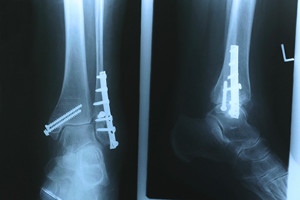(410) 764-7044
6506 Reisterstown Road, Baltimore
1205 York Road, Lutherville
6305 Belair Road, Baltimore
7809 Wise Avenue, Dundalk
What Are Stress Fractures?
Monday, 13 July 2020 00:00 A stress fracture is a tiny crack in the bone that occurs because too much stress was placed on the foot. Stress fractures don’t usually occur because of a particular trauma, but rather they gradually develop over time. Some causes of stress fractures include repetitive high-impact activities, increased training, low bone density, and poor nutrition. Most stress fractures can be diagnosed with x-rays, but an MRI or CT scan may be necessary for smaller and newer stress fractures. Upon the discovery of a stress fracture, a cast or walking boot may be necessary. Generally, stress fractures take around 4-6 weeks to heal, and a slow return to your normal activity will be needed. If you are feeling a gradual increase of pain in the feet that you believe may be a stress fracture, please consult with a podiatrist for a proper diagnosis.
A stress fracture is a tiny crack in the bone that occurs because too much stress was placed on the foot. Stress fractures don’t usually occur because of a particular trauma, but rather they gradually develop over time. Some causes of stress fractures include repetitive high-impact activities, increased training, low bone density, and poor nutrition. Most stress fractures can be diagnosed with x-rays, but an MRI or CT scan may be necessary for smaller and newer stress fractures. Upon the discovery of a stress fracture, a cast or walking boot may be necessary. Generally, stress fractures take around 4-6 weeks to heal, and a slow return to your normal activity will be needed. If you are feeling a gradual increase of pain in the feet that you believe may be a stress fracture, please consult with a podiatrist for a proper diagnosis.
Activities where too much pressure is put on the feet can cause stress fractures. To learn more, contact one of our podiatrists from Plaza Podiatry. Our doctors can provide the care you need to keep your pain free and on your feet.
Dealing with Stress Fractures of the Foot and Ankle
Stress fractures occur in the foot and ankle when muscles in these areas weaken from too much or too little use. The feet and ankles then lose support when walking or running from the impact of the ground. Since there is no protection, the bones receive the full impact of each step. Stress on the feet can cause cracks to form in the bones, thus creating stress fractures.
What Are Stress Fractures?
Stress fractures occur frequently in individuals whose daily activities cause great impact on the feet and ankles. Stress factors are most common among:
- Runners
- People affected with Osteoporosis
- Tennis or basketball players
- Gymnasts
- High impact workouts
Symptoms
Pain from the fractures occur in the area of the fractures and can be constant or intermittent. It will often cause sharp or dull pain with swelling and tenderness. Engaging in any kind of activity which involves high impact will aggravate pain.
If you have any questions please feel free to contact our offices located in Baltimore, Lutherville, and Dundalk, MD . We offer the newest diagnostic and treatment technologies for all your foot and ankle needs.




